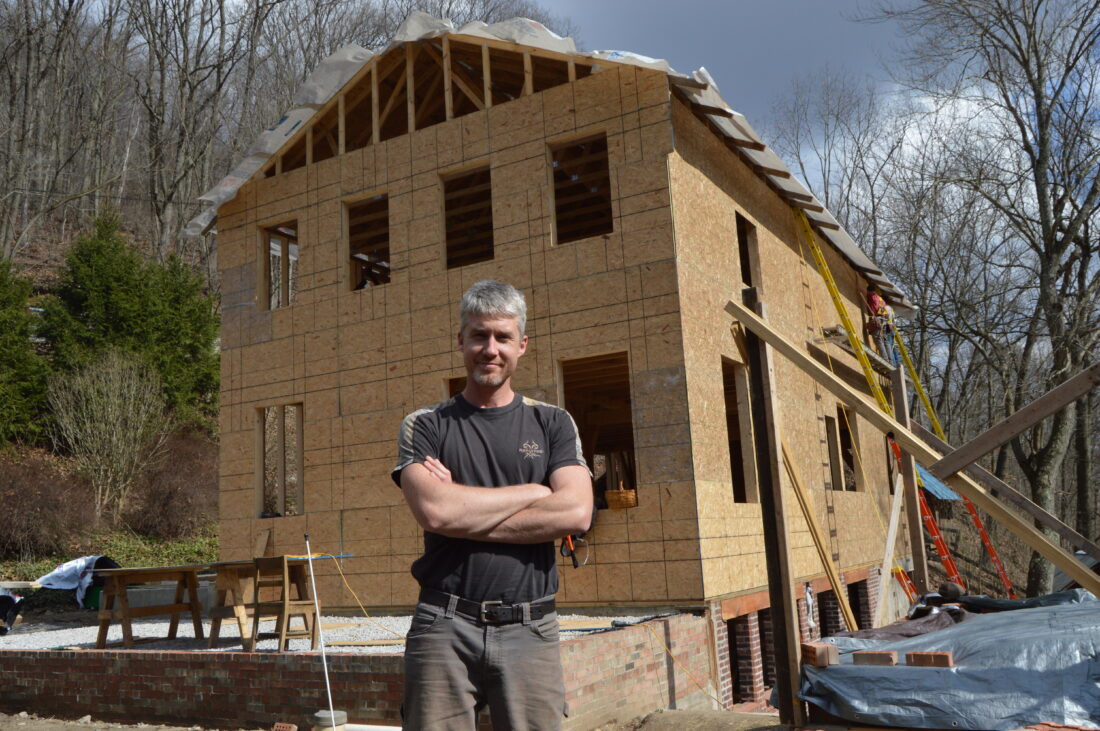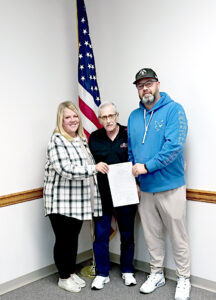Carrollton man rebuilding parents’ home, restoring family roots

Christopher Dacanay REBUILDING — Luke Dougherty stood by his parents’ Toronto home that he is rebuilding, with help from his siblings and children.
TORONTO — Luke Dougherty spends as much time as he can constructing his parents’ new home, after their previous dwelling was destroyed last year in a fire.
One of eight children to Shawn and Beth Dougherty, Luke is aided by some of his siblings and his own children in the effort, which retained parts of the original, early-1900s home’s foundation.
With plans drawn by Luke Dougherty’s brother, a University of Notre Dame architecture graduate, the home will include a timber-framed first floor, an open patio and a central masonry heater. On March 5, Dougherty said the work-in-progress home was set to have its walls fully enclosed within days.
Rebuilding efforts began mere weeks after the fire, which was caused by a battery failure, Luke Dougherty said. Work began with an immense public show of support, when around 100 people swarmed the Toronto property and helped deconstruct the burned home, saving money and as much of the original home as possible.
Luke Dougherty said the home’s completion date is set for Christmas, with the goal being to gather all eight of Shawn and Beth Dougherty’s children together for the holiday at the new home.
Along with his parents, Luke Dougherty is one of the founding members and directors of the Healing Land, a Jefferson County-based nonprofit dedicated to mentorship and education regarding regenerative farming practices and homesteading. To accomplish that, the nonprofit has hosted farm visits, conferences and lectures, which each draw attendees from across the nation.
With the house fire in May and Luke Dougherty having his hands full with its reconstruction, the Healing Land has temporarily stepped away from large events to focus on rebuilding.
Still, there have been events scheduled to continue the nonprofit’s educational work, including a four-part talk series on “Real Food and Real Community,” spanning from January to April. The series’ next session will feature Steubenville Grocery Box co-owner Marc Barnes speaking on “How to Support Your Local Producers” at 7 p.m. Thursday in the third-floor ballroom at Leonardo’s Coffeehouse.
Yet another event was a hog butchering workshop on March 1 and 2, led by Luke Dougherty and co-director Brian Burke at the latter’s Toronto farm.
Butchering is one of Luke Dougherty’s many skills, acquired during his adolescence on a homestead and while holding an abundance of farmhand jobs all over the U.S. as an adult.
Dougherty recalled being about 10 years old, when his family moved to the Toronto property his parents still occupy. They inhabited the former home building, which needed work but was eventually rendered livable.
Settling in, the Doughertys took on all kinds of animals — sheep, goats, pigs, chickens and a milk cow — care of which taught the children responsibility. The family had found its passion in the country, Luke Dougherty said, reminiscing about playing in the woods and closing the chicken coop at night.
When Luke Dougherty was 15, he subscribed to a magazine known as “Countryside,” which had a pen pal section. Somehow, Dougherty’s name ended up in the section, and a 15-year-old girl from Minnesota reached out to him as a homeschool project.
The two corresponded for years, and the girl helped him get summer jobs for her father in Minnesota. After graduating college early, Dougherty got engaged and he and Jessica were married and living in a straw bail house in Minnesota by the time Dougherty was 21, later going on to have six children together.
To this day, Dougherty said, he doesn’t know who put his name in “Countryside,” noting that it wasn’t him or his family.
“A miracle — that’s the only thing I can think of it as,” Dougherty said.
In Minnesota, Dougherty did carpentry before getting a job with a local meat processing store, where he was trained in commercial butchering. After about five years, Dougherty picked up sheep shearing for small flocks, later joining with his brother-in-law to start a business for which they’d shear about 30,000 sheep per year.
Later, Dougherty and his family moved to Oklahoma, where he went to school for horse shoeing. But time away from his family in Ohio was taxing, Dougherty said, so he moved with his family back to the Ohio Valley to work for a local carpenter while house hopping.
After two years in Ohio, Dougherty and his family moved to Montana, where he worked on a potato farm. While there, the family went on a family vacation to Wyoming — Luke Dougherty’s favorite state after working at a summer camp there when he was 18. The vacation was connected with Wyoming Catholic College’s family getaway program, which had a focus on outdoor activities.
“On the way back, we were thinking how we can spend more time there,” Dougherty recalled.
And so they did, with Dougherty returning for two years to run the summer camp, leading families in horseback riding, shooting, canoeing and whitewater rafting, all while “way out, away from everything.”
Finally, the Doughertys moved back to the Ohio Valley, settling on an 8-acre property in Carrollton, with Luke Dougherty returning to work as a carpenter while traveling short distances for sheep shearing and hose shoeing. Going on four years in Carrollton, Dougherty said he believes this is where the family will stay, along with their sheep, pigs, chickens and ponies.
Dougherty has contributed his event planning and various farmhand skills to the Healing Land’s mission.
His most recent endeavor has been developing an insulated refrigerator trailer — complete with hooks for carcasses and a winch for gutting — which he plans to develop more of and rent to families so they can do their own home butchering. Currently usable but still being refined, the trailer was used at Dougherty’s most recent butchering workshop.
Having been introduced to butchering by his father, Dougherty said butchering is meant to be a communal experience, noting, “It’s a lot of work on your own, and it’s more meat than one person needs at one time.”
Therefore, his goal of the rentable trailers is to enable families to butcher animals together, sharing their skills and the meat. It’s a lesson in the importance of community, which Dougherty said is something the modern world often lacks.
“Between technology and the wealth we have as a nation, we don’t need one another for survival. At its heart, that’s what community is — people who rely on one another. Tasks like butchering that require a lot of hands and are difficult bring families together to create that.”
Dougherty’s own community will be complete once again, if all goes according to plan and the whole family can once again unite for Christmas on the same property where their roots in the country began.



